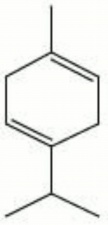Terpene
Jump to navigation
Jump to search
Description
Any unsaturated hydrocarbon of the formula C10H16 found in essential oils and oleoresins. Terpenes are based on five carbon isoprene unit. They are classified as monocyclic (dipentene), dicyclic (pinene) or aliphatic (myrcene). Examples of terpene derivatives, or terpenoids are: Camphor, Menthol, Terpineol, Borneol, and geraniol.
Synonyms and Related Terms
1-methyl-4-(1-methylethyl)-1,4-cyclohexadiene; terpeno (Esp.); terpène (Fr.); terpinene; terps
Risks
- Combustible. Flash point = 51C
- Fisher Scientific: MSDS
- Terpenes are considered a bio-based solvent that are obtained from a renewable resource
Physical and Chemical Properties
Miscible with ethanol, ether. Insoluble in water.
| Composition | C10H16 |
|---|---|
| CAS | 99-85-4 |
| Density | 0.8490 g/ml |
| Molecular Weight | mol. wt. = 136.24 |
Resources and Citations
- G.S.Brady, Materials Handbook, McGraw-Hill Book Co., New York, 1971 Comment: p. 297
- Richard S. Lewis, Hawley's Condensed Chemical Dictionary, Van Nostrand Reinhold, New York, 10th ed., 1993
- Van Nostrand's Scientific Encyclopedia, Douglas M. Considine (ed.), Van Nostrand Reinhold, New York, 1976
- The Merck Index, Martha Windholz (ed.), Merck Research Labs, Rahway NJ, 10th edition, 1983 Comment: entry 9315
- The American Heritage Dictionary or Encarta, via Microsoft Bookshelf 98, Microsoft Corp., 1998
